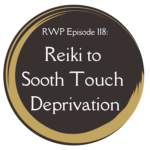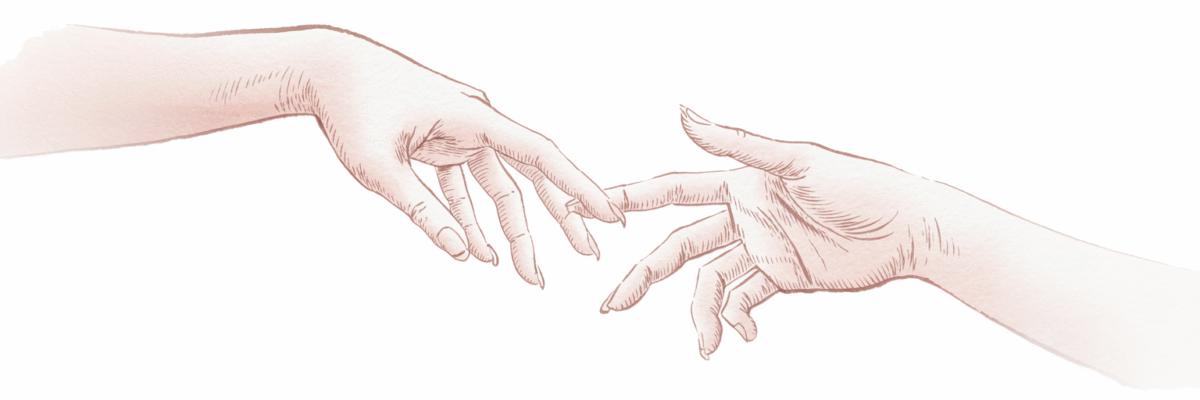
Reiki to Soothe Touch Deprivation with Reiki Women Podcast
February 5, 2024
Giving Too Much with Reiki Women Podcast
February 18, 2024After a discussion today on my Online Reiki Coaching group, it was disheartening to learn that some medical professionals today still overlook a holistic approach to health, failing to recognise the importance of integrating complementary therapies to enhance their patient’s well-being and consequent quality of life.
Incorporating the concept of well-being into patient care doesn’t diminish a medical professional’s expertise; rather, it enhances it. In fact, most patients would likely appreciate and value this holistic approach to their health.
I have put together some research that relates:
- the quality of our mental health to our physical health
- statistics about the prevalence of stress
- our general sense of well-being when using meditation, physical touch and chanting (three main elements of the system of Reiki).
It’s True, How You Feel Matters
The relationship between emotional well-being and physical health is supported by scientific research. It shows us that higher levels of emotional well-being are beneficial for recovery and survival rates in physically diseased patients, although the effects are small[1]. With more focus on these aspects of our lives, I am sure the effects can be even greater.
In the system of Reiki, we learn to improve our focus through meditation and this can be of immeasurable help when dealing with pain, discomfort, and emotional imbalance.
Another source highlights the protective role of subjective well-being in the course of physical illness, stating that those with ‘high’ levels of well-being are more likely to recover and survive illness [2].
In the context of mental health, the concept of recovery involves the development of new meaning and purpose in life, even within the limitations caused by illness, emphasising the importance of well-being in the recovery process[3].
Additionally, a self-management and recovery tool, “My Wellbeing Plan,” is based on the Wellness Recovery Action Plan (WRAP) and its principles, emphasising the role of well-being in the recovery approach[4].
Furthermore, positive psychology and recovery approaches are considered central in promoting well-being, particularly in mental health services[3].
Overall, scientific evidence supports the significance of emotional and subjective well-being in health, recovery, and survival.
Naturally, our bodies will inevitably age and change over time, yet it is the quality of our lives that truly holds the greatest significance and for this, there are practices that will support us.
Stress can be The Killer
Chronic stress too can have a significant impact on physical health. It has been linked to a variety of health problems, including heart disease, high blood pressure, digestive issues, headaches, muscle tension, weakened immune system, and an increased risk of developing or worsening serious conditions such as cardiovascular disease, obesity, and gastrointestinal problems[6][7][8].
The long-term activation of the stress response and overexposure to stress hormones can lead to these adverse effects on the body[7].
Stress can also influence behaviours that impact health, such as overeating, smoking, and alcohol or drug abuse[8].
Therefore, managing stress is crucial for maintaining good physical health. Effective strategies for reducing stress responses include maintaining a healthy social support network, engaging in regular physical exercise, and getting an adequate amount of sleep each night[6].
Ways to Feel Better
Meditation, physical touch and chanting have all been associated with various benefits for overall health, reducing stress and improved well-being. Here are a few statistics that offer insights into these benefits.
Benefits of Meditation
– Stress Reduction: Meditation is known for its ability to reduce stress and anxiety. It has been shown to lower the levels of the stress hormone cortisol, enhance mood, promote healthy sleep patterns, and boost cognitive skills[9].
– Improved Physical Health: Mindfulness meditation has been linked to improved physical health, including lower blood pressure, better functioning of the immune system, and a better ability to cope with pain[10][11].
– Mental Health Benefits: Mindfulness meditation has been used in the treatment of various mental health conditions, such as depression, substance abuse, anxiety disorders, and obsessive-compulsive disorder[11].
Benefits of Physical Touch
– Stress Relief: Physical touch acts as a social signal for safety, inhibiting fear and stress responses. It can be calming and act as a strong reset button, helping individuals reframe anxious thoughts[13].
– Emotional Well-Being: Physical touch, including hugging, has been found to be effective in managing symptoms of anxiety and promoting emotional well-being[13].
Both meditation and physical touch have been shown to have a positive impact on stress reduction, emotional well-being, and overall health. These practices can be valuable components of a holistic approach to maintaining well-being and managing health concerns[9][10][11][13].
Benefits of Chanting
Chanting has been linked to a range of benefits, including improved mood, reduced stress, cognitive benefits, physiological and psychological effects, stress relief, and enhanced mental well-being. These findings highlight the potential of chanting as a valuable practice for promoting overall health and well-being.
- Improved Mood and Reduced Stress: Research suggests that chanting leads to improved mood, reduced stress, and increased well-being, particularly during the global pandemic[14].
- Cognitive Benefits: Chanting may be associated with certain cognitive benefits such as increased mindfulness, decreased mind wandering, and enhanced cognitive skills related to attentional aspects of focusing on sounds[15].
- Physiological and Psychological Effects: Chanting is strongly associated with feelings of relaxation, induced by mechanisms such as slowed breathing. It may also confer physiological and psychosocial benefits, including reduced stress and enhanced social connection[16].
- Stress Relief and Mental Well-being: Chanting has been found to reduce cortisol levels, promote relaxation, and have a positive impact on mental health, including reducing symptoms of anxiety and depression[17].
- Health Benefits: Scientific evidence supports the health benefits of practicing mantra meditation, including stress relief and improved mental well-being[18].
Citations:
[1] https://www.ncbi.nlm.nih.gov/pmc/articles/PMC3439612/
[2] https://assets.publishing.service.gov.uk/media/5a7ba1d6ed915d4147621a24/Narrative__January_2014_.pdf
[3] https://bmchealthservres.biomedcentral.com/articles/10.1186/1472-6963-10-26
[5] https://www.researchintorecovery.com/what-is-recovery-and-wellbeing/
[6] https://www.apa.org/topics/stress/body
[7] https://www.apa.org/topics/stress/health
[8] https://www.webmd.com/balance/stress-management/stress-symptoms-effects_of-stress-on-the-body
[9] https://www.healthline.com/nutrition/12-benefits-of-meditation
[10] https://cpdonline.co.uk/knowledge-base/mental-health/all-about-mindfulness/
[11] https://www.helpguide.org/harvard/benefits-of-mindfulness.htm
[12] https://www.health.harvard.edu/staying-healthy/what-meditation-can-do-for-your-mind-mood-and-health-
[13] https://www.nami.org/Blogs/NAMI-Blog/February-2023/Embracing-Physical-Touch-and-Meditation-for-Emotional-Well-Being
[14] https://www.frontiersin.org/journals/psychology/articles/10.3389/fpsyg.2021.647632/full
[15] https://www.ncbi.nlm.nih.gov/pmc/articles/PMC9688188/
[16] https://link.springer.com/article/10.1007/s10943-023-01967-5
[17] https://www.traditionalmedicines.org/articles/positive-effects-of-aum-chanting-on-mental-health-well-being.pdf
[18] https://www.ncbi.nlm.nih.gov/pmc/articles/PMC9623891/






